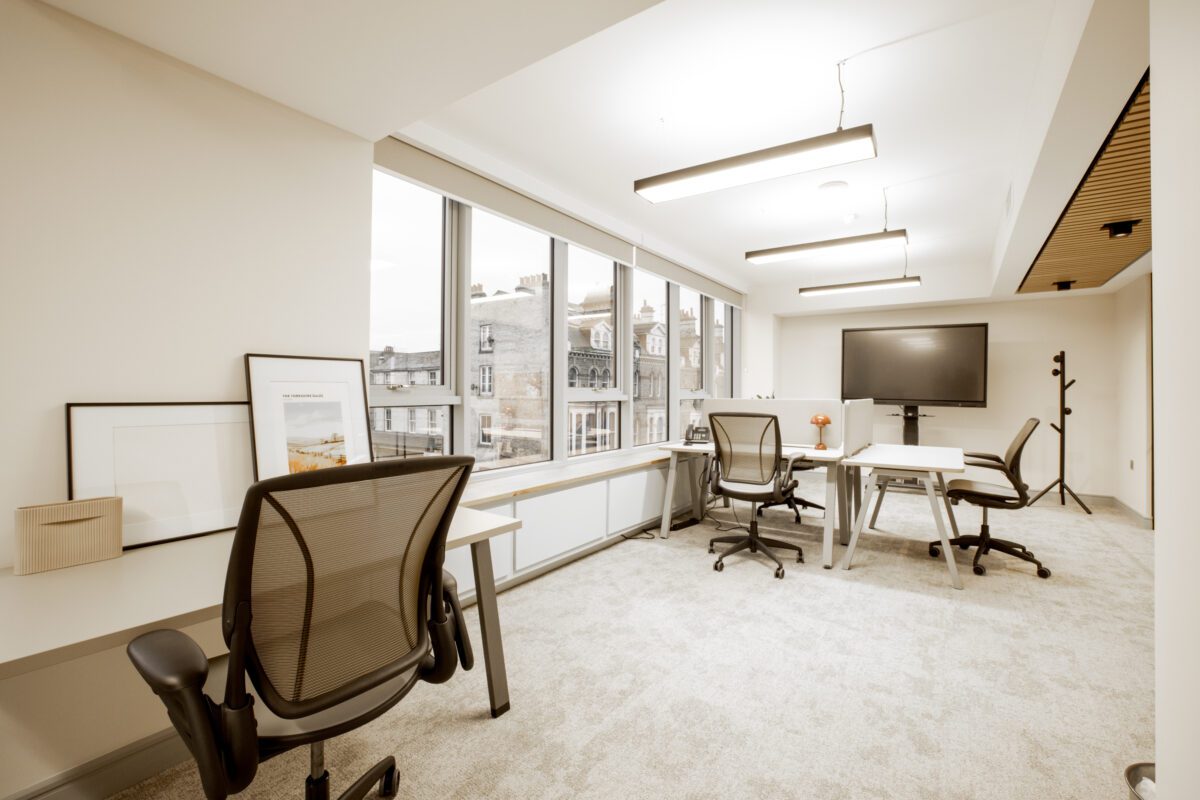Workplace trends for 2025: shaping the future of work

As we approach 2025, workplaces are undergoing transformative changes driven by technology, employee expectations, and sustainability goals. Companies are redefining how and where we work, aiming to create productive, flexible environments focused on well-being. Here are the key workplace trends to watch in 2025 and how WorkWell is poised to support businesses in navigating this evolution.
1 – Structured hybrid work as the new norm
The hybrid work model is no longer a temporary solution but a structured strategy. While there is undoubtedly a drift back to more time in the office, companies are finding a balance between remote and in-office work, encouraging employees to split their time to optimise productivity and collaboration. At WorkWell, our workspaces are designed to cater to this trend, offering fully equipped offices that accommodate remote teams and in-person meetings. With flexible lease options, businesses can adapt to this model seamlessly.
2 – Automation and frictionless office experiences
The first rule of any technology used in a business is that automation applied to an efficient operation will magnify the efficiency. Automation is transforming workplace operations, making manual tasks a thing of the past. From smart scheduling tools to automated lighting and temperature controls, frictionless office experiences are becoming standard. WorkWell’s offices feature state-of-the-art technology that supports seamless integrations, enabling businesses to focus on what matters most—innovation and growth.
3 – In-office collaboration drives performance
Research shows a strong correlation between in-office collaboration and high performance, particularly for sales and customer-facing teams. In response, companies are emphasising the value of in-person interactions. WorkWell’s thoughtfully designed collaboration spaces foster creativity and teamwork, empowering teams to deliver their best work.
4 – The rise of workplace operations teams
A new function, workplace operations, is emerging, blending IT, facilities, and operations to create smarter, more adaptive workplaces. This integrated approach ensures that spaces are optimised for both employee comfort and business efficiency. WorkWell provides customisable office solutions, allowing companies to reconfigure spaces as their needs evolve. Think of us as an outsourced member of the team, ready to build the ideal office environment to support productivity.
5 – Team-based seating arrangements
Gone are the days of hierarchical seating charts. In 2025, seating arrangements will be based on workstyles, encouraging collaboration among team members with similar roles and workflows. WorkWell’s modular office designs make it easy for businesses to implement team-based seating, fostering productivity and communication.
6 – Personalised work environments
Personalisation is becoming a cornerstone of office design. Employees expect immersive spaces that cater to their preferences, from ergonomic furniture to adjustable lighting. At WorkWell, we offer customisable workspaces that prioritise employee comfort, ensuring teams thrive in their environments.
7 – Increased remote work options
Flexibility remains a top priority, with 82% of executives planning to offer remote work at least part-time. WorkWell supports remote teams with access to coworking spaces worldwide, allowing employees to work from various locations without sacrificing connectivity or resources. Our team supports over 800 people every month, enabling them to seamlessly move between home and office.
8 – Office space reconfiguration
Dynamic office layouts are replacing static designs. Practices like hoteling, where employees reserve spaces as needed, are gaining popularity. WorkWell’s flexible office configurations and coworking solutions allow businesses to maximise space efficiency while adapting to changing demands.
9 – Sustainability and green skills
The demand for green skills is rising as companies focus on sustainability. Employees with expertise in environmental practices will be crucial in driving corporate responsibility. WorkWell is committed to sustainability, incorporating eco-friendly materials and energy-efficient systems into our office spaces to support these initiatives.
10 – Enhanced employee benefits
In the war for talent, companies are enhancing benefits packages to include living wages, affordable health insurance, and support for childcare and mental health. WorkWell’s wellness-focused amenities, such as on-site fitness centres and mental health resources, align with this trend, creating a holistic environment that prioritises employee well-being.
11 – AI-powered adaptive training
Personalised, AI-driven training programs are becoming integral to skill development. WorkWell’s tech-enabled spaces are equipped to host training sessions that utilise advanced learning technologies, ensuring employees stay ahead in a rapidly changing job market.
12 – Emphasis on work-life balance
Trends like quiet quitting and bare minimum Mondays highlight the need for work-life balance. Employees prioritise mental health and personal time, and businesses must adapt to these shifts. WorkWell’s flexible memberships and wellness-centric design help companies create spaces that support a healthier, more balanced lifestyle. Partnering with businesses to deliver the future of work.
As workplaces evolve, businesses need partners that understand their changing needs. WorkWell’s flexible, technology-driven office solutions are designed to help companies thrive in this new era. WorkWell offers the tools and environments needed to stay ahead of the curve, from hybrid-friendly workspaces to sustainability-focused designs.
By embracing these workplace trends, organisations can build innovative, inclusive, and future-ready cultures. With WorkWell, the future of work is not just a possibility—it’s here.
